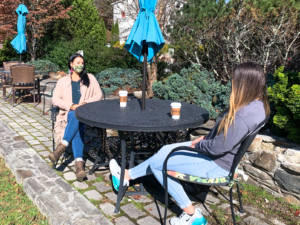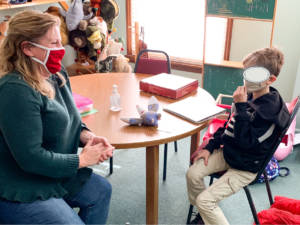by Tina Harrold, Lead Therapist Hendersonville, Angela Squire – Lead Therapist Winston-Salem, and Lauren Staley – Lead Therapist Avery
When the state of North Carolina shut down earlier this year in March, our clinical services teams had to adapt quickly in order to provide vital mental health services to the children we serve. As essential workers, therapists on our Avery and Winston-Salem campuses maintained their counseling schedules and continued to offer face-to-face services for the residential kids. Each therapist was charged following both Crossnore’s precaution protocols, as well as state guidelines. Therapists and children wore masks, worked outside as much as possible, and spaces were cleaned after each session.
Pivoting to Tele-Health
In all three locations, our outpatient therapists began working from home and pivoted quickly from face-to-face sessions to tele-health services. It was a big adjustment but staff were eager to continue providing needed services to their clients and families. These therapists completed the necessary training for tele-health, while the agency upgraded equipment, and staff solicited donations to provide hundreds of care packages with supplies needed for therapy such as notebooks, sketch pads, pencils, crayons, Play-Doh, stress balls, kinetic sand, and more.

Implementing tele-health required a two-day training to ensure that we were up-to-date with tele-health protocols and rules. It was a grueling training and most therapists completed it after hours or over the weekend. Staff meetings were increased in order to discuss process changes and to support one another in the changes. These meetings also allowed the staff to share resources as a group, which helped keep things fresh and fun for the kids and their families. An added benefit to tele-health was that we were able to reach so many clients through virtual communication that otherwise would have been without support during this time due to transportation and accessibility issues.
Most of our clients jumped right into tele-health and enjoyed the new activities. Many enjoyed sharing their spaces with their therapists and gave tours of their rooms. Therapists sent them on scavenger hunts to show the things in their homes that were important to the children. Tele-health presented a challenge for other clients, particularly for our youngest clients, with short attention spans, and those who have difficulty focusing. But we all worked together to come up with fun and innovative approaches to get the kids engaged in therapy, including puppet shows, interactive videos, or impromptu dance challenges.
Staff Challenges
As you may have experienced in your own life, COVID-19 brought challenges to our staff too. Quarantines for both staff and clients have made it difficult to see children regularly at times. Managing expectations has been hard as well, and conflicts have arisen between caregivers and the children that sometimes cause more aggressive behaviors and crises for our clients.
 It was also difficult for the staff to not be together in their teams. And as lead therapists, it was a challenge to train our new staff. Building team connections with daily interactions are really difficult when everything is virtual. But we make it work as this is our duty as clinicians – to serve our kids to the best of our ability and ensure their mental health needs are met, whatever that takes. Our teams have been strong in each other’s weaknesses and have put the kids’ needs first. According to our Sanctuary model, we put a large emphasis on self-care and general personal wellness.
It was also difficult for the staff to not be together in their teams. And as lead therapists, it was a challenge to train our new staff. Building team connections with daily interactions are really difficult when everything is virtual. But we make it work as this is our duty as clinicians – to serve our kids to the best of our ability and ensure their mental health needs are met, whatever that takes. Our teams have been strong in each other’s weaknesses and have put the kids’ needs first. According to our Sanctuary model, we put a large emphasis on self-care and general personal wellness.
Ensuring Resources for All.
Additionally, our staff has come together to make sure that each family has access to the resources they need, whether that is food, childcare, education in what their children are facing, and case management support. We are connecting with school counselors and social workers to support families as well. And, we are working to help families realize these changes are affecting everyone and to recognize that resilience is being built as they navigate through these difficult times.
 Even as the state guidelines have begun to ease up, we continue to utilize tele-health services where possible. We have opened up again in-person sessions on a case-by-case basis, particularly for younger children or those who have extensive trauma and need to make a face-to-face connection. Our COVID Task Force continues to monitor the situation and helps guide us in making the appropriate decisions to keep our staff, clients, and families safe.
Even as the state guidelines have begun to ease up, we continue to utilize tele-health services where possible. We have opened up again in-person sessions on a case-by-case basis, particularly for younger children or those who have extensive trauma and need to make a face-to-face connection. Our COVID Task Force continues to monitor the situation and helps guide us in making the appropriate decisions to keep our staff, clients, and families safe.
Success Stories
Although these last few months have been difficult, we have seen successes through our continued mental health services. In Hendersonville, therapist Kelly French delivered a care package to a client who had a lot of anxiety about going outside. He was so excited to see his therapist though that he ran outside and gave her a big hug. Another Hendersonville therapist, Eric Pitts, has helped an 18-year old client through tele-health as she has adjusted to several foster home changes and graduated high school in the spring. She is now enrolled in college and will be the first in her family to get a college education.
Our Avery therapists have had a number of clients who were reunited with their families or discharged to a foster home during COVID-19. This is great progress for these children, especially in the midst of a pandemic.
Finally, in Winston-Salem, one of our therapists has worked with a child grieving the death of her father. At first, her mother was unable to participate in therapy with her. But with tele-health, the mom has been able to be involved and together she and her daughter are working through their loss, including developing a memory book for her father. She has made so much progress that we expect her to be discharged from care by the time this blog post is published.
As therapists, we are grateful for the support we’ve received from Crossnore leadership. We especially appreciate the hard work of all our staffs and are grateful for the progress we see our clients making. We believe that True Heroes Grow Here!



